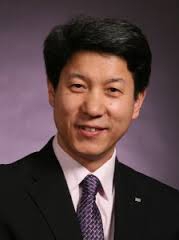-
Zhisheng Niu Seminar

Thu, Dec 11, 2014 @ 11:00 AM - 12:00 PM
Ming Hsieh Department of Electrical and Computer Engineering
Conferences, Lectures, & Seminars
Speaker: Zhisheng Niu, Tsinghua University
Talk Title: How Densely should the Traffic Base Stations be Deployed in Hyper-Cellular Networks?
Abstract: One of the key approaches to make the mobile communication networks more GREEN (Globally Resource-optimized and Energy-Efficient Networks) is to have the cellular architecture and radio resource allocation more adaptive to the environment and traffic variations, including making some lightly-loaded base stations (BSs) go to sleep. This is the concept of so-called TANGO (Traffic-Aware Network planning and Green Operation) and CHORUS (Collaborative and Harmonized Open Radio Ubiquitous Systems) published by the author earlier. To realize this, a new cellular framework, named hyper-cellular networks (HCN), has been proposed, in which the coverage of control signals is decoupled from the coverage of data signals so that the data coverage can be more elastic in accordance with the dynamics of traffic characteristics and QoS requirements. Specifically, the traffic base stations (TBSs) in HCN can be densely deployed during peak traffic time in order to satisfy the capacity requirement, while a portion of TBSs can be switched off or go to sleep mode if the traffic load is lower than a threshold in order to save energy. A fundamental question then arises: how densely should the TBSs be deployed in order to balance the QoS requirements and the energy consumption in hyper cellular networks?
In this talk, we characterize the optimal TBS density for both homogeneous and heterogeneous hyper cellular networks to minimize network cost with stochastic geometry theory. For homogeneous cases, both upper and lower bounds of the optimal TBS density are derived. For heterogeneous cases, our analysis reveals the best type of TBSs to be deployed for capacity extension or to be switched off for energy saving. Specifically, if the ratio between the micro TBS cost and the macro TBS cost is lower than a threshold, which is a function of path loss and their transmit power, then the optimal strategy is to deploy micro TBSs for capacity extension or to switch off macro TBSs (if possible) for energy saving with higher priority. Otherwise, the optimal strategy is the opposite. Based on the parameters from EARTH, numerical results show that in the dense urban scenario, compared to the traditional macro-only homogeneous cellular network with no TBS sleeping, deploying micro TBSs can reduce about 40% of the total energy cost, and further reduce about 20% with TBS sleeping capability.
Biography: Zhisheng Niu graduated from Northern Jiaotong University (currently Beijing Jiaotong University), Beijing, China, in 1985, and got his M.E. and D.E. degrees from Toyohashi University of Technology, Toyohashi, Japan, in 1989 and 1992, respectively. After spending two years at Fujitsu Laboratories Ltd., Kawasaki, Japan, he joined with Tsinghua University, Beijing, China, in 1994, where he is now a professor at the Department of Electronic Engineering, deputy dean of the School of Information Science and Technology, and director of Tsinghua-Hitachi Joint Lab on Environmental Harmonious ICT. He is also a guest chair professor of Shandong University. His major research interests include queueing theory, traffic engineering, mobile Internet, radio resource management of wireless networks, and green communication and networks.
Dr. Niu has been an active volunteer for various academic societies, including Director for Conference Publications (2010-11) and Director for Asia-Pacific Board (2008-09) of IEEE Communication Society, Membership Development Coordinator (2009-10) of IEEE Region 10, Councilor of IEICE-Japan (2009-11), and council member of Chinese Institute of Electronics (2006-11). He is now a distinguished lecturer (2012-13) of IEEE Communication Society, editor of IEEE Wireless Communication Magazine, associate editor-in-chief of IEEE/CIC joint publication âChina Communicationsâ, standing committee member of both Communication Science and Technology Committee under the Ministry of Industry and Information Technology of China and Chinese Institute of Communications (CIC), and vice chair of the Information and Communication Network Committee of CIC.
Dr. Niu received the Outstanding Young Researcher Award from Natural Science Foundation of China in 2009 and the Best Paper Awards (with his students) from the 13th, 15th and 19th Asia-Pacific Conference on Communication (APCC) in 2007, 2009, and 2013, respectively. He is now the Chief Scientist of the National Basic Research Program (so called â973 Projectâ) of China on "Fundamental Research on the Energy and Resource Optimized Hyper-Cellular Mobile Communication System" (2012-2016), which is the first national project on green communications in China. He is now a fellow of both IEEE and IEICE.
Host: Bhaskar Krishnamachari, Andreas Molisch
More Info: http://mhi.usc.edu/about/news/2014/12/01/distinguished-visiting-fellow-zhisheng-niu/
Location: Hughes Aircraft Electrical Engineering Center (EEB) - 132
Audiences: Everyone Is Invited
Contact: Elise Herrera-Green
Event Link: http://mhi.usc.edu/about/news/2014/12/01/distinguished-visiting-fellow-zhisheng-niu/
This event is open to all eligible individuals. USC Viterbi operates all of its activities consistent with the University's Notice of Non-Discrimination. Eligibility is not determined based on race, sex, ethnicity, sexual orientation, or any other prohibited factor.




